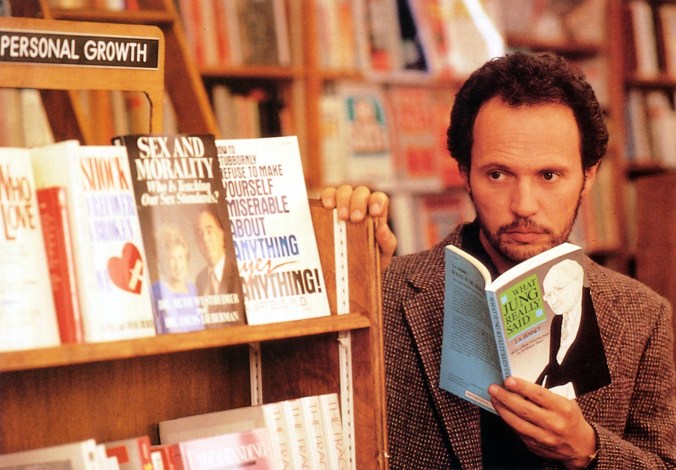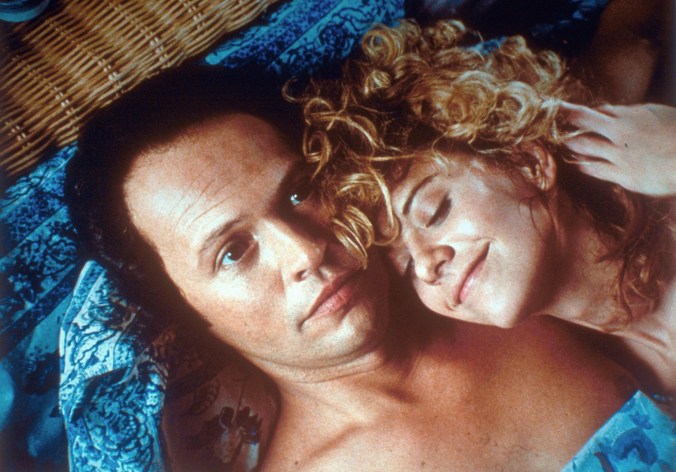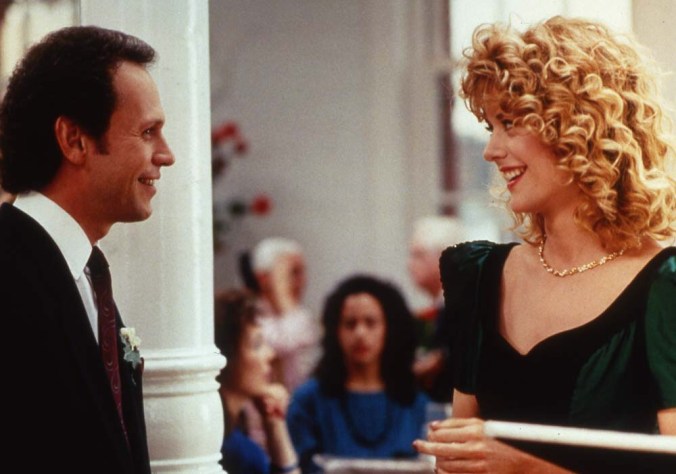YEAR: 1989
DIRECTOR: Rob Reiner
WRITER: Nora Ephron
KEY ACTORS: Billy Crystal, Meg Ryan, Carrie Fisher
CERTIFICATE: 15
IMDB SCORE: 7.6/10
ROTTEN TOMATOES SCORE: 90%
SEX SCORE: 3/5
✔️ Passes Bechdel test…just! Although most conversations between the named women are about men and dating, Sally and Marie talk about wedding dresses at one point and there are conversations at the wedding that don’t include men!
✔️ Rewatchable and still wonderful – despite my criticisms!
✔️ Inspired romantic fantasies more than sexual fantasies, and not always in a good way as it certainly encouraged me to see and believe possible futures with hot friends when I shouldn’t…
❌ But I don’t want to fuck them – they’re all much too neurotic for me!!
❌ And it’s not really sex positive. Sex is something men do with people they don’t like and where women must fake enjoyment in search of love..
As always, this contains spoilers so watch the film before you read on…
STREAMING: Netflix, YouTube (from £7.99), Amazon Prime (rent £3.49, buy £7.99), iTunes (rent £3.49, buy £8.99)
So it seems that my plan to start a blog looking critically at the sex content in movies was not as original as I thought – not only have I discovered a podcast on exactly this theme but also two days before I published my first review, my favourite sex educators and podcasters, Meg-John and Justin, released a special episode of their brilliant podcast that followed roughly the same idea. They watched When Harry Met Sally and recorded their live commentary, discussing the key themes within the relationships on screen, and I would definitely recommend listening to their thoughts as you watch the movie.
I was particularly pleased that they’d chosen this film to start as I’d always thought of When Harry Met Sally as a film about love but this rewatch has shown me that it’s much more a film about sex – and I have learned so much about sex and relationships from Meg-John and Justin that having their input definitely helped me see nuance that I might have otherwise missed.
Talking of favourite podcasts, I was also reminded of an old episode of the Allusionist that I was listening to recently that blew my mind a little. It claimed that dictionaries should be descriptive rather than prescriptive and describe current word usage rather than what might be considered the correct use, exemplified by the new definition of ‘literally’ to add emphasis. This crucial difference sprung to mind when watching this film – did Nora Ephron describe attitudes as she saw them in 1980s or did she create them?
Because this film is full of what would now be considered cliches about how men and women interact – women want love, men want sex; women are desperate to find The One amongst an ever shrinking pool of available men. And the main point of Ephron’s film is, of course, that men and women can’t be friends because they are too different. They approach sex and love too differently to relate to each other – as Harry puts it, ‘the sex part always gets in the way.’
But is that still true now? Was it even true then? Aside from being ridiculously heteronormative, it seems too simple, too stereotypical, and yet those are the stereotypes that exist in this film and are the same ones that we still have to fight against now. Women still bemoan how their age is reducing their attractiveness while men become more valuable, and friendships between opposite sexes are still often viewed with suspicion. So did the film describe how we already were or did it help create these divisions?
Now, I must emphasise that I do love this film and could happily watch it every day, but I also feel that it is starting to look dated and parts of it are certainly at odds with current attitudes. For example, this is another film where, on rewatching now, the male protagonist proves to be a bit of a creep! I have always struggled to like Harry and, while I can see why they’re friends, I now equally struggle to see him and Sally being happy long term. They’re just too different! She’s blonde, light and breezy while he has a dark side. They are optimist and pessimist, innocent and sexual, controlled and emotional, and as much as I enjoy this film, I just don’t think Harry is the nice person he’s supposed to be and it makes it difficult to like him.
I may be accused of making generalisations here but I think a lot of people know a guy like Harry and a lot of women know to be wary of him. He talks about sex even though he barely knows you, he lets you know whether or not he’d want to fuck you even though you’ve just met and now have to spend a long car ride alone together, he doesn’t listen when you say no and still sits next to you on a plane anyway or buys you a drink when you don’t want one. He feels that lying to or subtly manipulating the people he’s dating is just part of the game – ‘I don’t have to lie because I’m trying to get her into bed. I can just be myself.’ He mocks and negs you, making you feel grateful for every compliment. He’s funny but often at someone’s expense and he’s astonished when people don’t like him or when partners leave him.

Harry and Sally’s inevitable sex scene is both the culmination of the plot and the key moment in my understanding Harry’s character, because the fact that they had sex shouldn’t have been inevitable and it certainly shouldn’t have happened when it did. After controlling her emotions for so long, Sally’s breakdown at the news of Joe’s marriage does demonstrate how close a friendship she has with Harry as he is able to support her and actively listen to her, not ridiculing her for her hyperbole and just being there for her. But this means that he should have understood how vulnerable she is and he should have stopped the escalation to sex. As Meg-John questioned, was their friendship ruined afterwards because they had sex or because they had sex in a poorly consensual way? Harry knows that Sally hasn’t had sex since Joe, he knows that she doesn’t see sex as casually as him and yet he doesn’t stop. Even though he questions how she values sex – ‘I’m not saying it didn’t mean anything. I’m just saying why does it have to mean everything!’ – he knows how she feels about it. He is able to see clearly, he has the power; he took advantage of her.

So Sally’s distress afterwards is understandable – to put it mostly bluntly, she’s been violated by her friend – and Harry’s persistent demanding of her attention to try and fix his mistake is practically harassment. Again, Meg-John and Justin’s view here was really interesting – why do they need to fix their relationship by doubling down on their mistake? They both agreed that the sex didn’t feel right so why do they want to fundamentally change their relationship to a more sexual one? Perhaps Harry should have apologised and given Sally time to allow their friendship to recover instead. As Meg-John so succinctly put it, you can’t just show up and say I love you and make everything alright. In reality, can we expect the same fairytale ending?
Despite my concerns about Harry, however, Ephron does write about women in a much more positive and inspiring way. In her book about 80s movies, Hadley Freeman notes that the women have strong careers that are equal to their male counterparts – Sally even has same job as Harry’s friend Jess, both working as journalists for New York magazine. This is just not how professional women are now depicted in movies. They’re either bitches that need a man to put them in their place or work in safe, female friendly professions such as bakery, florists or fashion. The women in When Harry Met Sally are smart and capable, but it’s hardly even relevant. It’s just how it is and that’s kind of wonderful.
And although it is used as another way for Harry to mock her, Sally’s specific ordering habits do suggest a level of self-awareness that is admirable and, if I’m honest, somewhat enviable. It took me a really long time to know what I want and even longer to be able to ask for it, and I still sometimes struggle, but Sally is able to ask confidently for very complex meal orders right from the start. ‘I just want it the way I want it,’ she says and I would hope that this also translates to knowing what she wants sexually too! (This was another insight from Meg-John and Justin that makes a lot of sense!)
But I suspect that this was an accidental element of sex positivity as the female characters are generally shown as wanting love, rather than sex. Harry is able to have sex with people he doesn’t even like while Sally waits for someone she loves. The women are just so desperate to find The One – Marie, played by the wonderful and much missed Carrie Fisher, carries her Rolodex with potential dates on index cards with her and whips it out as soon as Sally announces that she’s single again, making jokes about literally finding someone before they all die. As a 34 year old women, I thought it was interesting choice to make the characters over 30 when the main action takes place. It adds a definite note of desperation to their search as their biological clocks keep ticking while the list of potential partners gets smaller and smaller. Is that why Harry and Sally are happy to risk having a sexual connection that isn’t perfect as they don’t think they have time to find better? Or do they just not see how they could stay such good friends if they’re not lovers?

There is a sense that Great Love means sacrificing great sex and Ephron uses Casablanca, a movie I might write about soon, as an analogy. Should Isla have stayed with Rick, claimed to be the best sex that she’s ever had, or gone with Victor, her steady and safe love? Young Sally chooses Victor, much to Harry’s disgust – ‘You’ve obviously never had great sex’ – but older Sally understands Rick’s appeal. Of course, Isla does choose Victor, perhaps just as Sally chooses Harry.
The loss of sex is longer term relationships is also almost stated as a fact without any critical judgement or contradiction. Initially Sally doesn’t want marriage or kids so that she and Joe can fly off to Rome at the drop of a hat or have sex on kitchen floor. She wants to keep all of the hot sex and freedom, even if she admits that she doesn’t utilise it, until her desire for a family trumps those needs. I risk being called hopelessly optimistic and as a new mother of a 6-month old I’d rather you didn’t contradict my hopes, but why can’t we have both? Surely it’s not too much to hope that we can fit our wish for a family into a relationship that otherwise satisfies us? Yes, spontaneous holidays may be a thing of the past but there are other ways to scratch that itch!
OK so I’m running out of space and oh my gosh, there is so much more that I could write about this film! Why are the men only able to talk intimately when they’re doing masculine activities, like playing baseball? Isn’t it clever that the film is set in such beautiful locations and yet the characters never notice them, just as they don’t notice the possibilities of love with each other? And because I can’t ignore the fake orgasm scene entirely, why do we always equate orgasms with good sex? Harry’s partners may have had great sex, even if they didn’t come!

So after all this, can men and women be friends?
It’s an area where my opinion has definitely changed over the past few years. I think I knew about When Harry Met Sally long before I actually saw the movie, so much so that I can’t actually remember when I first saw it, because my parents had a similar love story and were also friends for years before falling in love. As I wrote in my sex blog in 2015, this gave me a pretty skewed opinion on friendships between men and women because I always believed that everlasting love was a possibility. I argued that the sex part does get in the way and that friendships were always unbalanced, even if that was never acted on or acknowledged.
I do find the "men and women can't be friends" thing a really weird part of heterosexuality
— doctor acula (@Beardynoise) June 16, 2019
But I can see now that it’s actually a really messed up way to approach friendships! I fear it may be why I had so many unrequited loves in my twenties – they wanted friendship, I wanted more and, deep down, expected more and couldn’t see how weird that was. I do blame When Harry Met Sally for perpetuating this myth and giving hope to dreamers like me.
Because although it may be possible to fall in love with your best friend, it is much more valuable to understand that romantic relationships aren’t necessarily the top of the hierarchy. Deep, intimate but not sexual friendships can exist and can be wonderful. Feeling a strong emotional connection to someone doesn’t mean that they have to be a sexual partner, just as thinking they’re hot and wanting to fuck them doesn’t mean that they have to become a great love to stay in our lives. Changing relationship boundaries doesn’t need to ruin a friendship if it’s consensual and communication is open and equal. One person doesn’t have to be everything all the time.
We can have it all; we just have to be willing to ask for it and accept that some relationships have limitations. Or am I still being an optimistic dreamer?
‘You’re right, you’re right. I know you’re right.’
Next week: What Women Want

0 Comments
5 Pingbacks